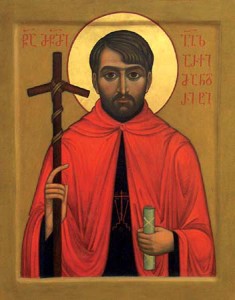St. Grigol (Gregory) Peradze was an academic, a scholar, a researcher of ancient manuscripts, a gifted linguist, a pastor and a monk – but above all, he is a saint of the Church. Throughout his life, his humility and willingness to seek the will of God and, at the end, his willingness to sacrifice his own life for another make him worthy of that title and an example for all of us.
Grigol was born into a family with many generations of priests. The boy expected to follow in the footsteps of his father and earlier ancestors and he graduated from the Theological School in Tblisi in 1918. The upheavals of World War I and the Russian Revolution caused Grigol to shift the focus of his further studies from theology to philology. He already knew Georgian, Russian and Church Slavonic and now he undertook to expand his knowledge of languages. He would eventually be able to do research in Hebrew, Syrian, Arabic, Coptic, Armenian, Greek, Latin, German, English, French and Danish.
In 1921, under the auspices of the Georgian Church, Grigol’s study of theology and language was continued when he was sent to Germany. His PhD dissertation topic, A History of Georgian Monasticism from its Creation until 1064, showed the direction of the young man’s studies. Traveling to England in 1927, Grigol studied the patristic manuscripts in the collections at the British Museum and the Bodlein Library in Oxford and he returned to Germany to teach Georgian and Armenian literature at the University of Bonn. After recovering from a serious illness in 1931, Grigol wrote a poem whose lines, in retrospect, were prophetic; “become a bridge to heaven” and “fire is your fate”. Grigol took monastic vows and was soon ordained to the priesthood. He was, by then, traveling throughout Europe, delivering lectures on theology and Georgian history and literature. In Paris, he helped with the founding of a parish for Georgians living in that city and was later named its pastor.
In 1932, Grigol was invited by the Metropolitan of Poland to teach at the University of Warsaw. During this time, he also continued his search for old manuscripts pertaining to Georgian history and liturgy, traveling in the Holy Land, Syria, and Italy in 1936-8. The now-Archimandrite Grigol knew that precious Georgian manuscripts had been removed at the time of the Soviet occupation of Georgia in the 1920s. They had been taken to Paris for safe-keeping and the monk was able to take possession of some of these in 1940, convincing the Nazis that they had no real value except to Georgians.
During this time of teaching, traveling, and serving Liturgy, Fr. Grigol was always concerned for those in need. He took special notice of poor students and Jews. He hid money for Jews who rightly feared that all their possessions would be confiscated by the Nazis.
On May 5, 1942, Fr. Grigol was arrested by the Gestapo for sheltering and aiding Jews and was taken to a prison in Warsaw. The manuscripts which he had been able to rescue disappeared from his apartment at this time. In November of that year, he was deported to Auschwitz. In that notorious concentration camp, one of the inmates killed a German officer. In retaliation, and seeking a confession from the guilty person, the soldiers ordered all the men in the barracks out into below freezing weather naked. According to the testimony of prisoners who survived Auschwitz, St. Grigol claimed responsibility for the murder to spare his fellow inmates. The guards sent dogs to attack the saint and then poured gasoline over him and lit him on fire.
Grigol Peradze was glorified as a martyr saint by the Georgian Orthodox Church in 1995. A faithful servant of the Church, a tireless worker for the study of the faith, a friend of the friendless and helpless, may St. Grigol pray for us.
